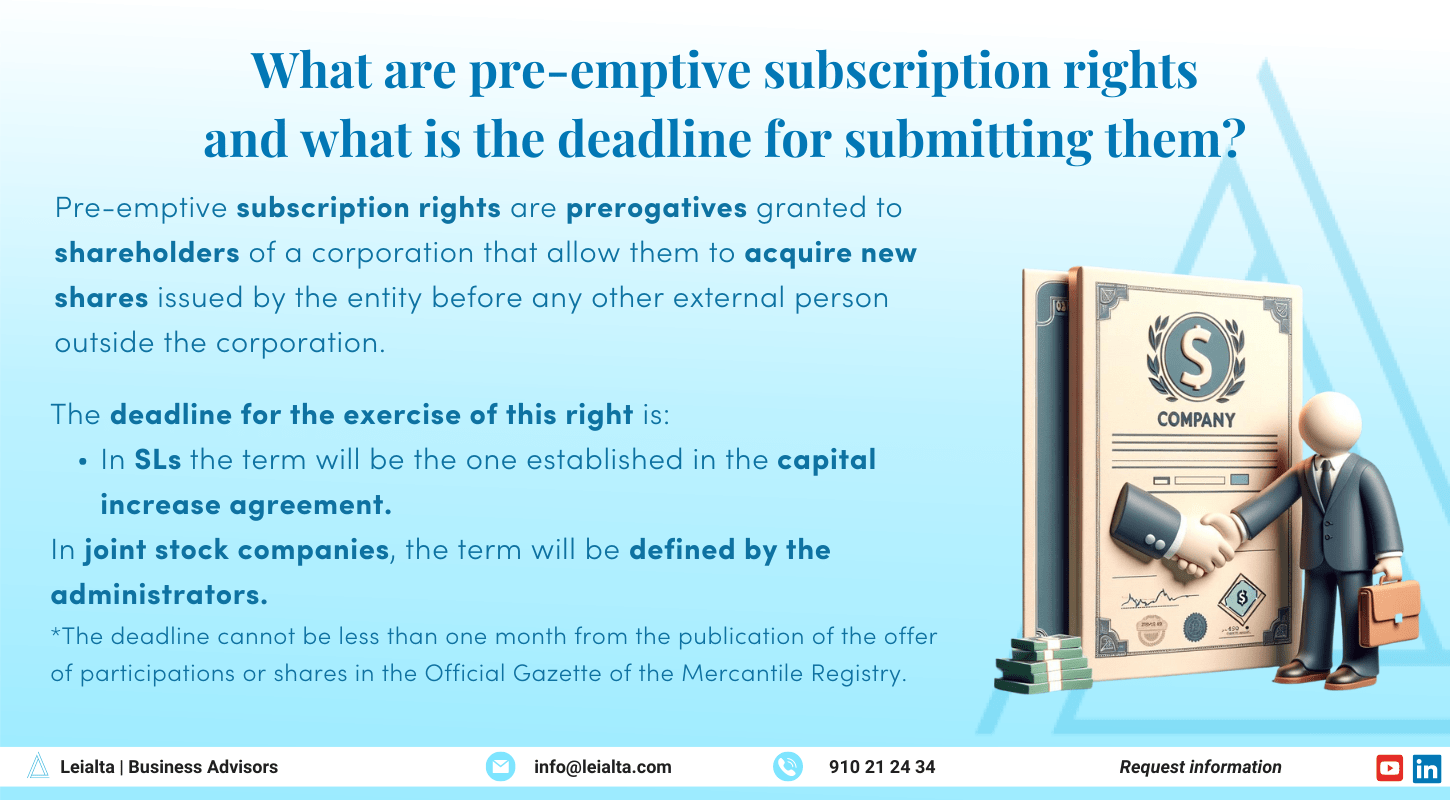
Do you want to maintain control of a company because a capital increase is going to be made? One of the ways to achieve this is through pre-emptive subscription rights. We tell you what they consist of, how they are regulated, whether they can be waived or not and the deadlines for exercising them.
What are preemptive subscription rights and where are they regulated?
Index of contents
In general, preemptive subscription rights are prerogatives granted to the shareholders of a commercial company that allow them to acquire new shares issued by the entity before any other external person outside the company.
This right ensures that existing shareholders can maintain their percentage interest in the company’s capital and prevents their shareholding from being diluted and their control over decision-making processes from being lost.
Pre-emptive subscription rights are a legal figure regulated in article 304 and the following articles of the Corporate Enterprises Act. Article 304 states the following:
- In the case of increases in share capital with the issue of new shares or new ordinary or preference shares against cash contributions, each shareholder shall be entitled to take up a number of shares or to subscribe to a number of shares in proportion to the nominal value of the shares held by him.
- There is no pre-emptive right if the increase in capital is due to the takeover of another company or of all or part of the assets and liabilities of another company or to the conversion of debentures into shares.
This right therefore allows shareholders to acquire a number of shares proportional to the share of capital they hold, except in the case of a takeover of another company or the conversion of bonds into shares.
From a legal point of view it is a right that functions as an option, not as an obligation. Shareholders can choose to exercise this right and buy more shares or they can waive it and allow those shares to be bought by other shareholders or interested third parties.
Another relevant aspect is that it is a right that can be transferred to another person. The transfer will be subject to the same limitations as the sale of shares.
Within what period of time can the right be exercised?
The deadline for exercising this right derives from the regulation of article 305 of the Corporate Enterprises Act and is as follows:
- In SLs, the deadline will be that established in the capital increase resolution.
- In joint stock companies, the term shall be defined by the directors.
- The deadline cannot be less than one month from the publication of the offer of shares in the Official Gazette of the Commercial Registry.
The key question is: what happens if not all shares in an SL are taken up when the preemptive right is exercised? In these cases, the administrative body will offer the shares to the shareholders who have exercised the right to take them up within 15 days. Once this period has expired, the shares can be offered to third parties outside the company.
Can this right be abolished?
In certain cases, according to the regulation of article 308 of the LSC, when the interests of the company so require, the general meeting may decide to fully or partially suppress the pre-emptive subscription right in the event of a capital increase.
Three requirements must be met in order for the cancellation to take place:
- A report must be drawn up by the company’s directors setting out the new securities and the persons who may subscribe for the new shares or holdings.
- The proposal to abolish the subscription rights must be clearly and concisely stated in the notice of the general meeting.
- That the value of the new shares corresponds to the actual value.
Implications of pre-emptive subscription rights
The exercise of preemptive subscription rights has an important strategic implication for shareholders because it prevents the dilution of their shareholding, and thus their control over the company, at a time when the company wants to grow. If this right were not used, the company would be left in the hands of third parties.
This is particularly relevant in family businesses so that the entity remains controlled by the family and not by third parties when it is passed on from one generation to the next or when the company grows.If you have any doubts about how to exercise this right or how to regulate it in the articles of association, at LEIALTA we offer you our team of expert advisors to guide you and carry out the procedures for you. If you need it, do not hesitate to contact us, we will be happy to help you with the procedures.



